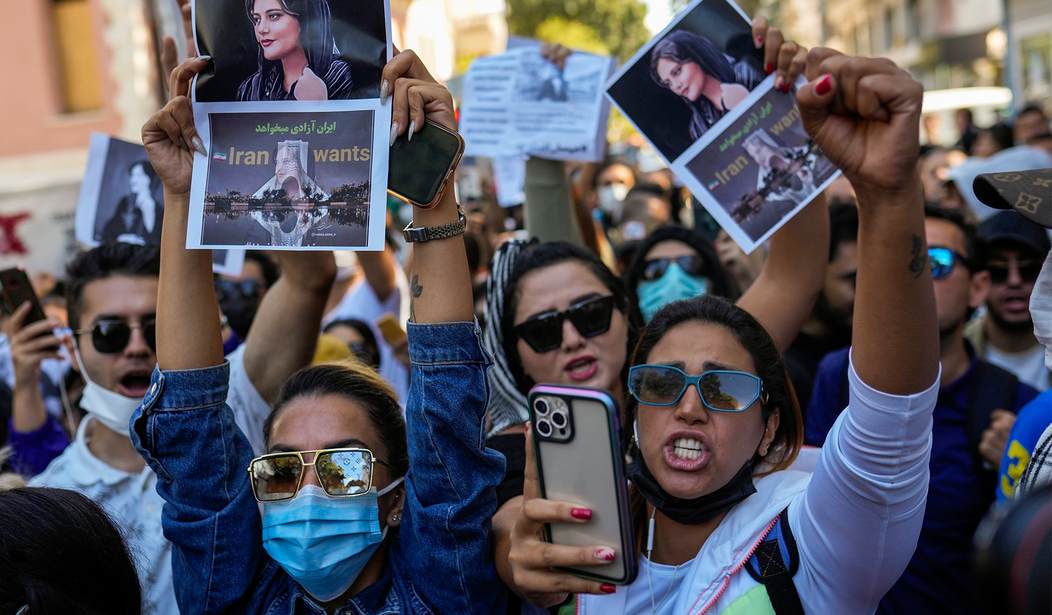The leadership of the Islamic Republic of Iran has suffered tremendous strategic setbacks in recent years. These include downturns in an already fragile economy and national currency, major blows to Hezbollah, and other elements of its so-called Axis of Resistance, and the loss of a key state ally as a result of Bashar al-Assad’s overthrow in Syria. Meanwhile, the regime has struggled to suppress dissent among its own people, and each new surge of unrest has threatened to exploit the vulnerabilities created by those other losses.
It should be easy to imagine how much more effective such unrest could be if the international community was politically on their side. Indeed, this was a major part of the message that Iranian expatriates sought to communicate to Western policymakers on Saturday when they held a rally in Paris, which marked the 46th anniversary of the revolution against the corrupt and despotic rule of Pahlavi dynasty.
“Another revolution is in the making,” said Maryam Rajavi, President-elect of the National Council of Resistance of Iran (NCRI), in a speech delivered to that rally online. She added: “The clerical regime is surrounded on all sides by the Resistance Units and the fearless, rebellious youth, a society brimming with rage and defiance, internal and external conflicts—especially after losing their most strategic footholds in the region.”
Her reference to “Resistance Units” reflects the fact that there is an organized network of activists operating all across the Islamic Republic with the expressed aim of facilitating open revolt against the mullahs’ regime. In earlier appearances alongside Western officials and lawmakers, Rajavi has noted that this network, guided by the NCRI’s main constituent group, the People’s Mojahedin Organization of Iran, is carrying out organizational and recruiting activities in service of a concrete plan for the regime’s overthrow.
The Resistance Units have already demonstrated great progress toward the implementation of that plan, helping to facilitate several nationwide uprisings in recent years, including the September 2022 uprising, which was widely recognized as the greatest challenge to the mullahs’ regime since its inception after the Shah’s overthrow. On Sunday evening, on the anniversary of the overthrow of the Shah, Resistance Units organized nightly slogans in several districts of Tehran and several cities throughout Iran with slogans like “Death to Khamenei (the supreme leader),” and “down with oppressor, be it the Shah or the supreme leader.”
Recommended
Saturday’s rally, attended by more than 20,000 expatriates and their international supporters, once again emphasized that the ranks of the Resistance Units have grown since then, as have the frequency and intensity of their operations.
Meanwhile, the NCRI has continued to make its case to Western policymakers, urging them to support the Resistance and the Iranian people by increasing pressure on the regime and endorsing their struggle to drive it out of power. Mrs. Rajavi reiterated that appeal in her speech, declaring:
“The fundamental right to rebel is ours—our people’s and that of freedom fighters everywhere. It is a right enshrined as a last resort against despotism and suppression in the preamble to the Universal Declaration of Human Rights… Therefore, the international community must recognize the right of the Iranian people and the Resistance Units to resist and overthrow the regime of execution and massacre. And instead of appeasing the mullahs, they should stand with the people of Iran.”
Thousands of Western policymakers had already embraced that appeal long before Saturday’s rally. Majorities in the US Congress and several European parliaments have approved resolutions endorsing the NCRI and urging more assertive policies toward a regime that makes no secret of its commitment to violently suppressing the coalition and Mrs. Rajavi’s Ten-point Plan for a free, pluralist, secular-democratic, and non-nuclear future for Iran. What’s more, the rally received expressions of support in advance from 50 former world leaders, further illustrating the growth of international recognition of the NCRI’s viability and clarity of vision.
Sadly, that trend has yet to translate into similar clarity of purpose in Western policy. As of recently, the strategies tended toward appeasement of the clerical regime, often as a reflection of misplaced hopes that “moderate” elements within it might spearhead reform on their own. The rally also illustrated, once again, the folly of that optimism, with Mrs. Rajavi pointing out, for instance, that Supreme Leader Ali Khamenei had just rejected negotiations with the United States as “not wise, not intelligent, not honorable.”
It is not clear whether such negotiations were on the table in the first place. Although President Trump has expressed interest in a “nuclear peace agreement,” he also issued an executive order last week re-implementing his previous administration’s policy of “maximum pressure.”
It is time that other Western powers follow the US’ lead by greatly increasing economic sanctions on the Iranian regime, while isolating it diplomatically.
These measures have always been the most appropriate reaction to Iran’s various malign activities, but their potential impact is greatly amplified by recent developments inside Iran and throughout the surrounding region. They would be amplified all the more if the leaders and governments implementing those measures saw fit to side with the Iranian Resistance and make it clear both to the regime and to the Iranian people that the international community has decided to support those advocating democracy.

























Join the conversation as a VIP Member